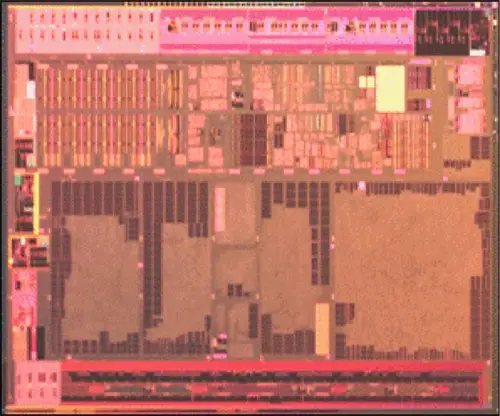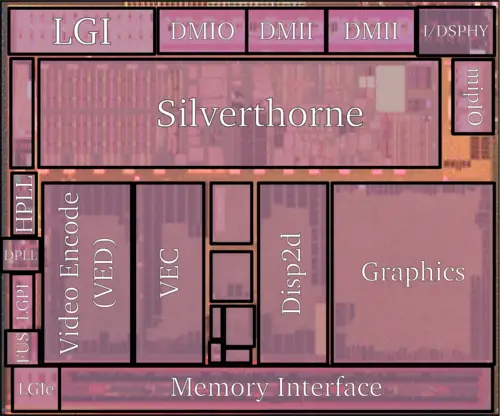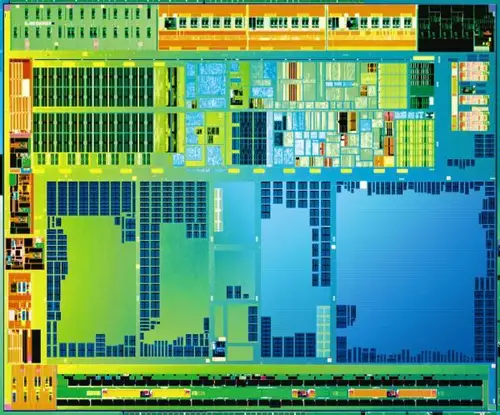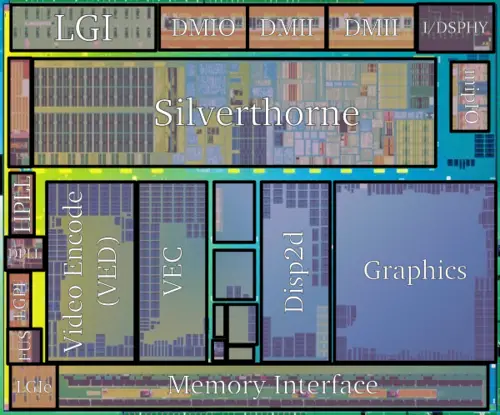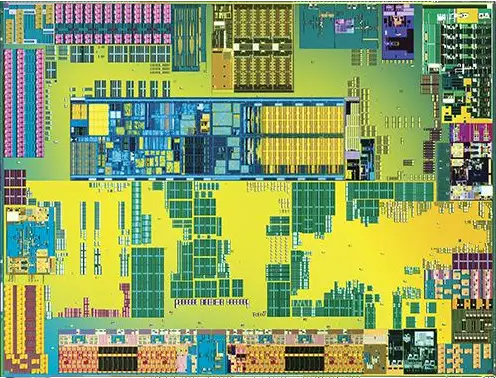(→Die Shot) |
(→Common Features) |
||
| (3 intermediate revisions by the same user not shown) | |||
| Line 33: | Line 33: | ||
== Overview == | == Overview == | ||
| − | {{ | + | {{main|intel/microarchitectures/bonnell#Second_Generation_Enhancements|l1=Bonnell § Second Generation Enhancements}} |
| + | Lincroft is a complete [[system on a chip]] incorporating both the southbridge and the {{\\|silverthorne}} core from the previous generation on-die. The improvements resulted in up to x50 reduction in idle power, x2 reduction over overall system board size, and x2 reduction in overall system active power consumption. Lincroft incorporates the CPU core along with the 3d [[integrated graphics|graphics]], the hardware video acceleration, [[display controller]], and [[memory controller]]. | ||
| + | |||
| + | In addition to the higher integration, Lincroft employs an extensive set of [[intel/microarchitectures/bonnell#Low-power_features_2|power-saving features]] including Enhanced Geyserville (eGVL/ULLFM mode) allowing for an additional ultra-low c-state and heavy power gating techniques. Lincroft also introduced a couple of new performance features such as {{intel|Burst Mode}} and [[intel/microarchitectures/bonnell#Bus_Turbo_Mode_.26_Burst_Mode|Bus Turbo Mode]]. | ||
=== Common Features === | === Common Features === | ||
| − | {{ | + | * '''TDP:''' 1.3 W - 3 W |
| + | * '''ISA:''' Everything up to {{x86|SSSE3}} ({{x86|SMM}}, {{x86|FPU}}, {{x86|NX}}, {{x86|MMX}}, {{x86|SSE}}, {{x86|SSE2}}, {{x86|SSE3}}, {{x86|SSSE3}}) | ||
| + | * {{arch|32}} | ||
| + | * 800 MHz - 1.5 GHz | ||
| + | * Up to 1.8 GHz burst | ||
| + | * Integrated Memory Controller | ||
| + | ** DDR-400 / DDR2-800 | ||
| + | ** 1-2 GiB | ||
| + | * Integrated Imagination Technologies {{imgtec|PowerVR SGX535}} GPU @ 200-400 MHz | ||
| + | {{clear}} | ||
== Members == | == Members == | ||
| Line 48: | Line 60: | ||
{{comp table start}} | {{comp table start}} | ||
<table class="comptable sortable tc13 tc14 tc15 tc16 tc17 tc18 tc19 tc20 tc21 tc22"> | <table class="comptable sortable tc13 tc14 tc15 tc16 tc17 tc18 tc19 tc20 tc21 tc22"> | ||
| − | <tr class="comptable-header"><th> </th><th colspan="20">List of Lincroft-based | + | <tr class="comptable-header"><th> </th><th colspan="20">List of Lincroft-based Processors</th></tr> |
| − | <tr class="comptable-header"><th> </th><th colspan="9">Main processor</th><th colspan="2"> | + | <tr class="comptable-header"><th> </th><th colspan="9">Main processor</th><th colspan="2">Memory</th><th colspan="2">[[IGP]]</th><th colspan="3">Features</th></tr> |
| − | {{comp table header 1|cols=Family, Price, Process, Launched, C, T, Freq, TDP, | + | {{comp table header 1|cols=Family, Price, Process, Launched, C, T, Freq, Burst, TDP, Type, Mem, Name, Frequency, Package, {{intel|Hyper-Threading|HT}}, Burst}} |
{{#ask: [[Category:microprocessor models by intel]] [[instance of::microprocessor]] [[core name::Lincroft]] | {{#ask: [[Category:microprocessor models by intel]] [[instance of::microprocessor]] [[core name::Lincroft]] | ||
|?full page name | |?full page name | ||
| Line 60: | Line 72: | ||
|?core count | |?core count | ||
|?thread count | |?thread count | ||
| − | |?base frequency#GHz | + | |?base frequency#MHz |
| + | |?turbo frequency (1 core)#GHz | ||
|?tdp#mW | |?tdp#mW | ||
| − | |? | + | |?supported memory type |
| − | |? | + | |?max memory#GiB |
| − | |? | + | |?integrated gpu |
| + | |?integrated gpu base frequency | ||
|?package | |?package | ||
|?has simultaneous multithreading | |?has simultaneous multithreading | ||
| − | |?has intel | + | |?has intel burst performance technology |
|format=template | |format=template | ||
|template=proc table 3 | |template=proc table 3 | ||
| − | |userparam= | + | |sort=model number |
| + | |userparam=18:17 | ||
|mainlabel=- | |mainlabel=- | ||
}} | }} | ||
Latest revision as of 02:24, 23 April 2017
| Edit Values | |
| Lincroft | |
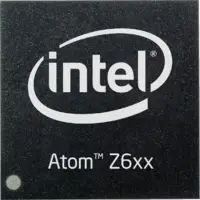 | |
| Lincroft MPU | |
| General Info | |
| Designer | Intel |
| Manufacturer | Intel |
| Introduction | April 2, 2008 (announced) |
| Microarchitecture | |
| ISA | x86-32 |
| Microarchitecture | Bonnell |
| Word Size | 4 octets 32 bit8 nibbles |
| Process | 45 nm 0.045 μm 4.5e-5 mm |
| Technology | CMOS |
| Succession | |
Lincroft is the core name for Intel's second generation of Bonnell-based processors serving as a successor to Silverthorne. Those ultra-low power chips were manufactured on Intel's 45 nm process and were specifically aimed for the Mobile Internet device (MID) market.
Contents
Overview[edit]
- Main article: Bonnell § Second Generation Enhancements
Lincroft is a complete system on a chip incorporating both the southbridge and the silverthorne core from the previous generation on-die. The improvements resulted in up to x50 reduction in idle power, x2 reduction over overall system board size, and x2 reduction in overall system active power consumption. Lincroft incorporates the CPU core along with the 3d graphics, the hardware video acceleration, display controller, and memory controller.
In addition to the higher integration, Lincroft employs an extensive set of power-saving features including Enhanced Geyserville (eGVL/ULLFM mode) allowing for an additional ultra-low c-state and heavy power gating techniques. Lincroft also introduced a couple of new performance features such as Burst Mode and Bus Turbo Mode.
Common Features[edit]
- TDP: 1.3 W - 3 W
- ISA: Everything up to SSSE3 (SMM, FPU, NX, MMX, SSE, SSE2, SSE3, SSSE3)
- 32-bit
- 800 MHz - 1.5 GHz
- Up to 1.8 GHz burst
- Integrated Memory Controller
- DDR-400 / DDR2-800
- 1-2 GiB
- Integrated Imagination Technologies PowerVR SGX535 GPU @ 200-400 MHz
Members[edit]
| List of Lincroft-based Processors | ||||||||||||||||||||
|---|---|---|---|---|---|---|---|---|---|---|---|---|---|---|---|---|---|---|---|---|
| Main processor | Memory | IGP | Features | |||||||||||||||||
| Model | Family | Price | Process | Launched | C | T | Freq | Burst | TDP | Type | Mem | Name | Frequency | Package | HT | Burst | ||||
| Z600 | Atom | 45 nm 0.045 μm 4.5e-5 mm | 4 May 2010 | 1 | 2 | 800 MHz 0.8 GHz 800,000 kHz | 1.2 GHz 1,200 MHz 1,200,000 kHz | 1,300 mW 1.3 W 0.00174 hp 0.0013 kW | DDR-400 | 1 GiB 1,024 MiB 1,048,576 KiB 1,073,741,824 B 9.765625e-4 TiB | PowerVR SGX535 | 200 MHz 0.2 GHz 200,000 KHz | FCBGA-518 | ✔ | ✔ | |||||
| Z605 | Atom | 45 nm 0.045 μm 4.5e-5 mm | 4 May 2010 | 1 | 2 | 1,000 MHz 1 GHz 1,000,000 kHz | 2,200 mW 2.2 W 0.00295 hp 0.0022 kW | DDR-400 DDR2-800 | 2 GiB 2,048 MiB 2,097,152 KiB 2,147,483,648 B 0.00195 TiB | PowerVR SGX535 | 400 MHz 0.4 GHz 400,000 KHz | FCBGA-518 | ✔ | ✔ | ||||||
| Z610 | Atom | 45 nm 0.045 μm 4.5e-5 mm | 4 May 2010 | 1 | 2 | 800 MHz 0.8 GHz 800,000 kHz | 1.2 GHz 1,200 MHz 1,200,000 kHz | 1,300 mW 1.3 W 0.00174 hp 0.0013 kW | DDR-400 DDR2-800 | 2 GiB 2,048 MiB 2,097,152 KiB 2,147,483,648 B 0.00195 TiB | PowerVR SGX535 | 400 MHz 0.4 GHz 400,000 KHz | FCBGA-518 | ✔ | ✔ | |||||
| Z612 | Atom | 45 nm 0.045 μm 4.5e-5 mm | 4 May 2010 | 1 | 2 | 900 MHz 0.9 GHz 900,000 kHz | 1.5 GHz 1,500 MHz 1,500,000 kHz | 1,300 mW 1.3 W 0.00174 hp 0.0013 kW | DDR-400 DDR2-800 | 2 GiB 2,048 MiB 2,097,152 KiB 2,147,483,648 B 0.00195 TiB | PowerVR SGX535 | 400 MHz 0.4 GHz 400,000 KHz | FCBGA-518 | ✔ | ✔ | |||||
| Z615 | Atom | 45 nm 0.045 μm 4.5e-5 mm | 4 May 2010 | 1 | 2 | 1,200 MHz 1.2 GHz 1,200,000 kHz | 1.6 GHz 1,600 MHz 1,600,000 kHz | 2,200 mW 2.2 W 0.00295 hp 0.0022 kW | DDR-400 DDR2-800 | 2 GiB 2,048 MiB 2,097,152 KiB 2,147,483,648 B 0.00195 TiB | PowerVR SGX535 | 400 MHz 0.4 GHz 400,000 KHz | FCBGA-518 | ✔ | ✔ | |||||
| Z620 | Atom | 45 nm 0.045 μm 4.5e-5 mm | 4 May 2010 | 1 | 2 | 900 MHz 0.9 GHz 900,000 kHz | 1.6 GHz 1,600 MHz 1,600,000 kHz | 1,300 mW 1.3 W 0.00174 hp 0.0013 kW | DDR-400 DDR2-800 | 2 GiB 2,048 MiB 2,097,152 KiB 2,147,483,648 B 0.00195 TiB | PowerVR SGX535 | 400 MHz 0.4 GHz 400,000 KHz | FCBGA-518 | ✔ | ✔ | |||||
| Z625 | Atom | 45 nm 0.045 μm 4.5e-5 mm | 4 May 2010 | 1 | 2 | 1,500 MHz 1.5 GHz 1,500,000 kHz | 1.9 GHz 1,900 MHz 1,900,000 kHz | 2,200 mW 2.2 W 0.00295 hp 0.0022 kW | DDR-400 DDR2-800 | 2 GiB 2,048 MiB 2,097,152 KiB 2,147,483,648 B 0.00195 TiB | PowerVR SGX535 | 400 MHz 0.4 GHz 400,000 KHz | FCBGA-518 | ✔ | ✔ | |||||
| Z650 | Atom | 45 nm 0.045 μm 4.5e-5 mm | 11 April 2011 | 1 | 2 | 1,200 MHz 1.2 GHz 1,200,000 kHz | 3,000 mW 3 W 0.00402 hp 0.003 kW | DDR-400 DDR2-800 | 2 GiB 2,048 MiB 2,097,152 KiB 2,147,483,648 B 0.00195 TiB | PowerVR SGX535 | 400 MHz 0.4 GHz 400,000 KHz | FCBGA-518 | ✔ | ✘ | ||||||
| Z670 | Atom | $ 75.00 € 67.50 £ 60.75 ¥ 7,749.75 | 45 nm 0.045 μm 4.5e-5 mm | 11 April 2011 | 1 | 2 | 1,500 MHz 1.5 GHz 1,500,000 kHz | 3,000 mW 3 W 0.00402 hp 0.003 kW | DDR-400 DDR2-800 | 2 GiB 2,048 MiB 2,097,152 KiB 2,147,483,648 B 0.00195 TiB | PowerVR SGX535 | 400 MHz 0.4 GHz 400,000 KHz | FCBGA-518 | ✔ | ✘ | |||||
| Count: 9 | ||||||||||||||||||||
Die Shot[edit]
- See also: Bonnell § Lincroft Die
Moorestown Platform[edit]
- 45 nm process
- 140,000,000
- Die size 7.34 mm × 8.89 mm
- Size area 65.2526 mm²
Oak Trail Platform[edit]
| designer | Intel + |
| first announced | April 2, 2008 + |
| instance of | core + |
| isa | x86-32 + |
| main image | 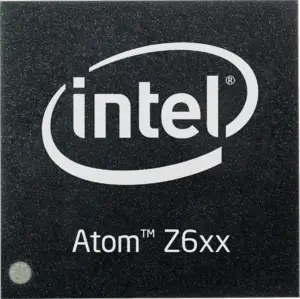 + + |
| main image caption | Lincroft MPU + |
| manufacturer | Intel + |
| microarchitecture | Bonnell + |
| name | Lincroft + |
| process | 45 nm (0.045 μm, 4.5e-5 mm) + |
| technology | CMOS + |
| word size | 32 bit (4 octets, 8 nibbles) + |
